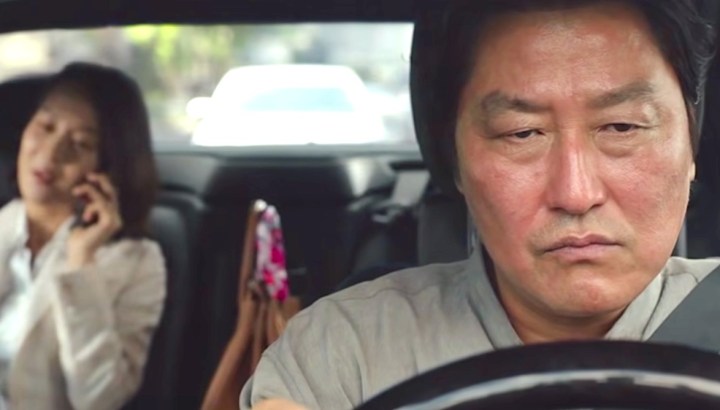Back in theaters, Parasite is the perfect thriller for our post-Luigi world

Five years after it took the Cannes Film Festival, the Academy Awards, and the global box office by storm, Parasite is back on the big screen. That’s a pretty short amount of time to commemorate with an anniversary rerelease. Then again, it’s been a long five years, hasn’t it? Oh, how the world has changed since the halcyon days of 2019 — “the last f***ing year for cinema,” to quote Quentin Tarantino, whose Once Upon a Time… in Hollywood premiered within hours of Bong Joon-ho’s darkly ingenious class-warfare caper. In retrospect, Parasite winning Best Picture on Oscar night a few months later really did feel like the final joyous surprise of an old era — a last gasp before COVID closed theaters and changed everything.
Watching the film today, via its current IMAX victory lap or from the comfort of your own home, actually emphasizes the ways things haven’t changed so much these past five years. Or maybe it’s just that the tensions and resentments Parasite dramatized back then have fully exploded to the surface of the culture, as surely as they simmer to a boil in the climax of the movie. Like Mr. Kim (Song Kang-ho), people are fed up. Does his shocking act of violence look so shocking these days? You might think suddenly of a real, more premeditated crime that just stirred the media into a frenzy and sent a jolt of understanding through the public — a murder with a motive so clear, the killer etched it on the bullets.
Yes, the time is right for a Parasite encore. It’s very much a movie for the moment, a tale of rage and desperation fit for our post-Luigi Mangione world. At the same time, there’s no mistaking this South Korean award-winner — more acclaimed, perhaps, than any film that’s come in its wake — for a simple eat-the-rich parable. Not with Bong at the reins. The sheer slipperiness of his demented take on upstairs-downstairs drama is what elevates it beyond mere timeliness.
The title alone is provocative in its potential double meaning. Who are the parasites in this story of a destitute family, the Kims, that latches itself to the payroll teat of a wealthy family, the Parks? It’s less a trick question than a Rorschach test. Parasite’s huge success the world over could reflect a certain universal frustration, the kind that the murder of a CEO just illuminated like a black light. Or it could be chalked up to people seeing what they want to see in the master-servant relationship that develops between these economically entwined clans. To win the top prize on Hollywood’s biggest night, the film had to have spoken to people who saw a kind of horror movie about the dangers of opening your house to the help.
Bong leaves us to sort through our biases. He’s too shrewd a dramatist to reduce his characters to emblems of their social station — to divide our sympathies by tax bracket alone. The Parks are not cartoon fat cats. They are clueless and easily manipulated, in the case of Mrs. Park (Cho Yeo-jeong), or snobbishly condescending, in the case of Mr. Park (Lee Sun-kyun), who prefers those he hires respect professional boundaries and not “cross the line.” Their most odious offense is rudely fixating on odor. They are awful in the casual, everyday way that the wealthy can be. They are recognizably human, not blatant guillotine fodder.
Likewise, the Kims are not cardboard saints — the noble working-class heroes a more self-righteous parable might position upon a pedestal. They are, at times, bluntly and hilariously underhanded. They lie and steal and screw over other people for a shot at the cash the Parks thoughtlessly splurge on luxury and convenience and creature comforts. Parasite says that desperate times call for desperate measures. Every transgression in the movie is a scramble to survive. “Money is an iron,” as Mrs. Kim (Jang Hye-jin) says. It smooths out the difficulties of life — and with them, the challenges to our moral compasses.

No one widely familiar with Bong’s work could confuse Parasite for a pro-elite cautionary tale, even if its narrative wickedly toys with the Saltburn-like fears of a ruling class paranoid that the Great Unwashed are coming for them. Rarely one for didactic screeds, the writer-director has spent most of his career smuggling his class politics onto screens under cover of rollicking genre scenarios. Take The Host, which savages American imperialism and corporate disregard for public safety in the form of a primo kaiju movie of original Gojira vintage. Or Snowpiercer, which takes late-stage capitalism to its logical endpoint, with all that remains of civilization stuffed aboard a train endlessly looping a ravaged planet. It’s arranged like a social ladder turned on its side, the poor in the back, the rich in the front.
Parasite flips that hierarchical structure vertically again: Here, privilege is a matter of altitude — a theme established right from the subterranean opening shot. The film is one of Bong’s most purely entertaining Trojan horses. That, maybe more than its politics, might account for its enduring popularity and for its ability to smash the language barriers that traditionally keep films not in English off the box-office charts and out of the Academy’s winner circle. For a while, it almost plays like an Ocean’s Eleven-style heist movie where the “score” is gainful employment. And the twists arrive with dizzying force, Bong opening his satirical scenario up into the realm of perverse farce (no doors are slammed, but tables are scurried under) and downright Hitchcockian thrills. Parasite remains about as fun as any movie this ultimately, witheringly downbeat can be.
The Parks aren’t the real villains of the film. They’re but a symptom of an unjust system. Capitalism is a zero sum game in Parasite. It keeps the 99% divided, fighting over the same crumbs, scrambling for the same tiny wedge of the pie. Most of the violence in the movie is between the Kims and the family of the housekeeper (Lee Jung-eun) they muscle out of a job. Only in the climax, when all hell breaks loose at that party, do the Parks experience any kind of reckoning. And it’s hard to call that a victory, regardless of where your sympathies lie. After all, Mr. Kim’s actions don’t even radicalize his son, Ki-woo (Choi Woo-shik), who remains seduced by a fantasy of upward mobility, dreaming of keeping up with the Joneses (or Parks).

Since 2019, Parasite’s finger hasn’t left the pulse of an economically lopsided world. The Kims don’t see the big picture of their misadventure — namely, that they’re trying to win a rigged game on an uneven playing field, and that they’re trapped in a system designed to keep them literally and figuratively down. But the audience might see that picture more clearly than ever. After all, Parasite has returned to theaters at a time when newsfeeds are filled with daily reminders of the unjust disparity of life under capitalism. It remains a crazed crowdpleaser for an exploited world, building madcap complications around its social conscience… never mind the inconvenient truth that every ticket bought puts a few extra dollars in the pockets of the Friedkins, a family whose wealth makes the Parks look like the Kims.
All that said, you have to wonder if the pointedly unsubtle Parasite might actually be a little too subtle for 2025. In a key scene, the Kims sit around, drinking the Park family’s liquor, enjoying the mirage of a life within the household they serve. “She’s rich, but still nice,” Mr. Kim says of his employer, to which his wife replies, with a snort: “She’s rich, therefore she’s nice.” Right now, though, the mask of niceness the obscenely monied often wear has slipped. As these words are written, and maybe as you read them, the world’s richest man is waging war on the middle and lower class in broad daylight — unlawfully destroying public services, hurting American workers to line his own pockets, slashing cancer research for kids. Him and his kind are monsters too broad for the broadest of satires, the kind Bong would be embarrassed to put in a movie. They’re parasites in the truest sense.
Parasite is currently playing on select IMAX screens, streaming on Netflix, and available to rent or purchase from digital services owned by wealthy men who don’t care about you. For more of A.A. Dowd’s writing, visit his Authory page.



